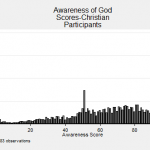Here’s a very interesting article by Stanford anthropologist, Tanya Luhrmann, about gender and prayer. Specifically, she takes on the issues of why women pray more than men, and the answer, she writes, is imagination.
Previously I blogged on the finding that Christian women experience God’s presence more frequently than do men, which would fit with Luhrmann’s general point.
Here’s Luhrmann’s article:
” Women pray more than men do. The 2008 Pew U.S. Religious Landscape Survey found that two-thirds of all women surveyed pray daily, while less than half of all men surveyed do. The Pew survey was unusually large, accounting for over 35,000 Americans, but gender differences in prayer frequency have been found before (notably by Paloma and Gallup in 1991). In fact, the observation is so common that among evangelicals, we hear it repeated as a cliché.
Why do women pray more? Some argue it’s because women are more conservative, that they stick more to tradition, while others believe it’s because women feel more responsible for their families’ health and well being than men do.
As an anthropologist studying religious behavior, I have a different explanation: Women pray more because women are more comfortable with their imaginations, and in order to pray, you need to use your imagination.
Let me be clear. I am not suggesting that God is a product of the imagination. I am instead noting that to know God intimately, you need to use your imagination, because the imagination is the means humans must use to know the immaterial. This, by the way, is something the church fathers knew well. For Augustine, the road to God ran through the mind. It is our own peculiar era that equates the imagination with the frivolous and the unreal. That is why contemporary Christians sometimes get nervous about the word imagination. But they shouldn’t. C. S. Lewis knew so well that the imagination was a path to God that he entitled a chapter of Mere Christianity “Let’s Pretend.” “Let us pretend,” Lewis writes, “to turn the pretence into a reality.”” (To read the rest)











